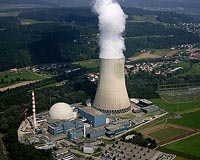 |
Hanoi (AFP) June 17, 2010 Vietnam must start now to implement safety measures including public oversight for its first nuclear power plant, which is scheduled to begin operations in 10 years, experts said Thursday. The energy-hungry communist country is making preparations to start construction in 2014 of its first atomic power facility. Initial plans call for four reactors, with a total capacity of 4,000 megawatts, at least one of which should be operational from 2020. Ensuring their safety is about more than technical competence, Atsuyuki Suzuki, the former head of Japan's nuclear safety commission, told AFP. "Also we need to have some kind of social mechanism to watch whether the nuclear community is doing the correct thing or not... mass media for instance," Suzuki said on the sidelines of an international conference on technology and safety in nuclear power plants. Nikolay Kutin, chairman of the Russian agency responsible for atomic supervision, told delegates that the public should participate in the review of regulatory documents. "And such practices exist in many countries," he said. Vietnam already posts government documents for public review, and its communist-dominated legislature has become increasingly vocal on major issues. But restrictions on the news media and Internet have been criticised by foreign rights groups and Western donors. Mun-Ki Lee, director of a regional body that operates under the International Atomic Energy Agency (IAEA), said Vietnam has made "significant progress" on nuclear science and technology but must set up a safety system and secure qualified workers. "When you start the nuclear power programme you cannot go step by step," he told AFP. "You have to go simultaneously, nuclear power programme and the safety, together." The 2020 target gives it enough time, said Lee, director of the 17-member sub-set of IAEA members from the Asia-Pacific, called the Regional Co-operative Agreement. Other Southeast Asian countries are exploring the possibility of nuclear power, despite what detractors say is the area's lack of experience with the technology, and safety concerns in a region prone to natural disasters. Vietnam will need international assistance as its nuclear effort takes shape, experts said. "Everything to be done in this field must be absolutely safe and in full compliance with international law," Igor Khovaev, minister-counsellor at the Russian embassy, told delegates. Vietnam is planning to establish a national nuclear safety council to help guide the government on the issue, the official Vietnam News Agency reported. Sources in February said Hanoi has decided to award Russia's state atomic energy firm Rosatom a contract to build the first nuclear plant. Japan is reportedly interested in helping to construct future Vietnamese atomic power stations, and in March the United States and Hanoi signed a memorandum of understanding on nuclear energy cooperation. That pact highlighted the former foes' joint commitment "to developing the highest possible safety and security standards for the Vietnamese nuclear sector", US ambassador Michael Michalak told the conference. He said both sides want to take that pact further in the form of a full agreement for peaceful nuclear cooperation, a prerequisite for nuclear sales from the United States.
Share This Article With Planet Earth
Related Links Nuclear Power News - Nuclear Science, Nuclear Technology Powering The World in the 21st Century at Energy-Daily.com
 Swedish parliament approves nuclear plant replacements
Swedish parliament approves nuclear plant replacementsStockholm (AFP) June 17, 2010 Sweden's parliament on Thursday narrowly passed a landmark government proposal allowing the replacement of nuclear reactors at the end of their life span. The centre-right coalition government's proposal in February last year to reverse an earlier decision to phase out nuclear power was approved by parliament after an all-day debate, with 174 votes in favour and 172 against. Three member ... read more |
|
| The content herein, unless otherwise known to be public domain, are Copyright 1995-2010 - SpaceDaily. AFP and UPI Wire Stories are copyright Agence France-Presse and United Press International. ESA Portal Reports are copyright European Space Agency. All NASA sourced material is public domain. Additional copyrights may apply in whole or part to other bona fide parties. Advertising does not imply endorsement,agreement or approval of any opinions, statements or information provided by SpaceDaily on any Web page published or hosted by SpaceDaily. Privacy Statement |